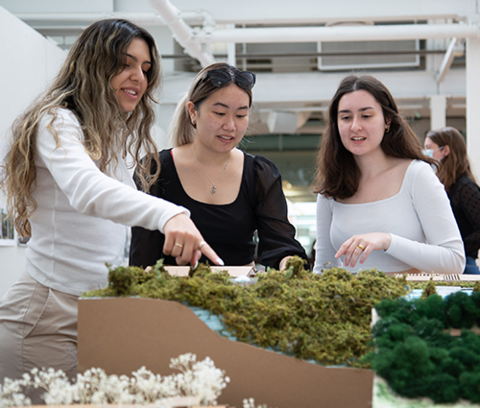
Bachelor of Architectural Studies (BAS)
The Honours Bachelor of Architectural Studies degree provides the foundation of skills, knowledge, judgement and practical experience required for subsequent professional studies in architecture.
Our pre-professional Academic Program is fully dedicated to imparting to students the culture and practice of design. Design is a synthetic activity. To do it well and serve the needs of the individual and society requires an extremely broad education. Students acquire an understanding of the workings of society and culture, of the principles of physics, of materials and techniques of construction, of the human interaction with the natural and built environment, of historical process, of critical thought and of the diverse forms of creative expression.
Theme areas
Courses in the Honours Bachelor of Architectural Studies degree, are arranged in five main thematic groups:
Design: The practice of design and the understanding of its theories and methods.
Visual and Digital Media: The use of creative and analytical tools and techniques.
Cultural History and Theory: The understanding of cultural and historical forces shaping the built world.
Technology and Environment: The understanding of materials and methods, building technologies, and environmental issues and systems critical to the making of architecture.
Urbanism and Landscape: An introduction to urbanism and landscape and the organization of natural and human ecologies.
Design
The design courses are the primary focus of Architecture and are informed both directly and indirectly by the knowledge and skills developed in the other theme areas. Design courses are conducted in the form of studios in which students undertake a series of directed design projects, aimed to illustrate and engage practical, theoretical and aesthetic issues of architectural conception, and progressively establish expertise and understanding.
The projects range from fundamental design studies of building elements to large-scale architectural complexes, in exercises which include individual and multiple habitation, design in natural and built environments, development of building programs, studies of principal building types, and urban design. In the final term, design, theory, technology, environment and urban issues are fully integrated into a major project— the comprehensive building design project and technical report.
Visual and Digital Media
The visual and digital media sequence acts as a support for the design studio, introducing multiple methods of visualization that act as communicative, analytical and generative tools for architecture. These courses build aptitude and understanding in the use of architectural tools and techniques, from hand-drawing and drafting in two dimensions to advanced three-dimensional digital modeling, visualization and fabrication. At the upper levels of the curriculum and within elective coursework this focus area introduces a range of courses in traditional visual media as well as an expanded series of digital offerings in areas such as parametric design, rapid prototyping using CAD/CAM technologies, and interaction.
Cultural History and Theory
The cultural history and theory sequence is concerned with the human imagination, the forms through which it expresses itself, and the larger socio-political contexts within which it is enacted. In these courses students are exposed to works of history, philosophy, literature and the arts, learning about architecture, urbanism and landscape within a broad cultural context that enriches their understanding. Architecture is thus conceived as a form of cultural expression and the creative activity of all students takes place against a background of humanistic study. The academic program fosters critical, discursive and expressive abilities that are essential to the quality of the School and its graduates.
Technology and Environment
The study of the technical aspects of building and design begins with a series of courses that provide students with an understanding of the materials and methods of building construction, structural design and analysis, and environmental issues and their impact on design. Within this sequence students learn not only about the technologies of buildings and their material systems and assemblies, but also about architecture’s essential relationship with its environmental context, as they are introduced to important topics such as sustainability, building energy, and environmental assessment systems such as Leadership in Energy and Environmental Design (LEED TM). Upper level electives in this sequence give students the opportunity to engage in design-build projects and offer coursework in such areas as materials, advanced structural systems, alternative energy systems and ecological design among others.
Urbanism and Landscape
At Waterloo, students learn about architecture within the larger context of urbanism and landscape, and are introduced to the organization of larger systems, from settlement patterns to the morphology of cities, throughout their education. In this sequence students are exposed to the principles of urban and landscape design in relation to natural and human ecologies and have the opportunity to study architecture and contemporary urbanism firsthand through the Rome program, one of the essential components of the curriculum, and upper level global cities courses that offer study abroad electives focused on international architecture, urbanism and landscape in cities throughout Europe,
Professional Practice
Students gain invaluable architectural professional experience through the co-op program which integrates two years of alternating paid work terms into the pre-professional course of study. Through co-op, Waterloo Architecture students expand their professional education and opportunities as they apply their knowledge and skills within architectural firms all over the world.
Contact the Undergraduate Program Coordinator for inquiries regarding Bachelor of Architectural Studies (BAS) admissions, courses and consultation.



